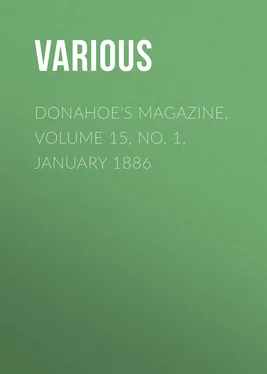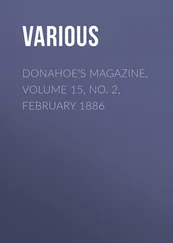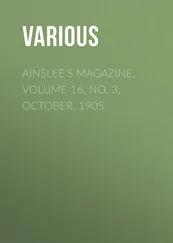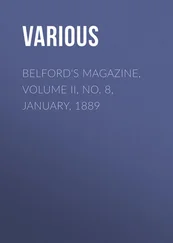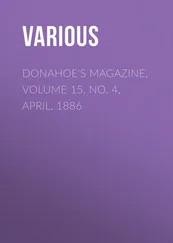Various - Donahoe's Magazine, Volume 15, No. 1, January 1886
Здесь есть возможность читать онлайн «Various - Donahoe's Magazine, Volume 15, No. 1, January 1886» — ознакомительный отрывок электронной книги совершенно бесплатно, а после прочтения отрывка купить полную версию. В некоторых случаях можно слушать аудио, скачать через торрент в формате fb2 и присутствует краткое содержание. Издательство: Иностранный паблик, Жанр: foreign_antique, periodic, foreign_edu, на английском языке. Описание произведения, (предисловие) а так же отзывы посетителей доступны на портале библиотеки ЛибКат.
- Название:Donahoe's Magazine, Volume 15, No. 1, January 1886
- Автор:
- Издательство:Иностранный паблик
- Жанр:
- Год:неизвестен
- ISBN:нет данных
- Рейтинг книги:3 / 5. Голосов: 1
-
Избранное:Добавить в избранное
- Отзывы:
-
Ваша оценка:
- 60
- 1
- 2
- 3
- 4
- 5
Donahoe's Magazine, Volume 15, No. 1, January 1886: краткое содержание, описание и аннотация
Предлагаем к чтению аннотацию, описание, краткое содержание или предисловие (зависит от того, что написал сам автор книги «Donahoe's Magazine, Volume 15, No. 1, January 1886»). Если вы не нашли необходимую информацию о книге — напишите в комментариях, мы постараемся отыскать её.
Donahoe's Magazine, Volume 15, No. 1, January 1886 — читать онлайн ознакомительный отрывок
Ниже представлен текст книги, разбитый по страницам. Система сохранения места последней прочитанной страницы, позволяет с удобством читать онлайн бесплатно книгу «Donahoe's Magazine, Volume 15, No. 1, January 1886», без необходимости каждый раз заново искать на чём Вы остановились. Поставьте закладку, и сможете в любой момент перейти на страницу, на которой закончили чтение.
Интервал:
Закладка:
But these things, although full of reasonableness and foresight, are not so well approved of at this time, when States not only refuse to refer to the laws of Christian knowledge, but are seen even to wish to depart each day farther from them. Nevertheless, because truth brought to light is wont of its own accord to spread widely, and by degrees to pervade the minds of men, we, therefore, moved by the consciousness of the greatest, the most holy, that is the Apostolic obligation, which we owe to all the nations, those things which are true, freely, as we ought, we do speak, not that we have no perception of the spirit of the times, or that we think the honest and useful improvements of our age are to be repudiated, but because we would wish the highways of public affairs to be safer from attacks, and their foundations more stable, and that without detriment to the true freedom of the peoples; for amongst men the mother and best guardian of liberty is truth: " The truth shall make you free. " (John viii. 32).
Therefore at so critical a juncture of events, Catholic men, if, as it behooves them, they will listen to us, will easily see what are their own and each other's duties in matters of opinion as well as of action . And in the formation of opinion, whatsoever things the Roman Pontiffs have handed down, or shall hereafter hand down, each and every one is it necessary to hold in firm judgment well understood, and as often as occasion demands openly to declare. Now, especially concerning those things which are called recently-acquired liberties , is it proper to stand by the judgment of the Apostolic See, and for each one to hold what she herself holds.
Take care lest some one be deceived by the honest outward appearance of these things; and think of the beginnings from which they are sprung; and by what desires they are sustained and fed in divers places. It is now sufficiently known by experience of what things they are the causes in the State; how indiscriminately they bring forth fruit, of which good men and wise rightly do repent. If there should be in any place a State, either actual or hypothetical, that wantonly and tyrannically wages war upon the Christian name, and it have conferred upon it that character of which we have spoken, it is possible that this may be considered more tolerable; yet the principles upon which it rests are absolutely such that, of themselves they ought to be approved by no man.
Now action may be taken in private and domestic affairs, or in affairs public. In private life, indeed, the first duty is to conform one's life and manners to the precepts of the Gospel, and not to refuse, if Christian virtue demands, something more difficult to bear than usual. Individuals, also, are bound to love the Church as their common mother; to keep her laws obediently; to give her the service of due honor, and to wish her rights respected, and to endeavor that she be fostered and beloved with like piety by those over whom they may exercise authority. It is also of great importance to the public welfare diligently and wisely to give attention to the duties of citizenship; in this regard, most particularly, with that concern which is righteous amongst Christians, to take pains and pass effective measures so that public provision be made for the instruction of youth in religion and true morality, for upon these things depends very much the welfare of every State. Besides, in general, it is useful and honorable to stretch the attention of Catholic men beyond this narrower field, and to embrace every branch of public administration. Generally, we say, because these our precepts reach unto all nations. But it may happen in some particular place, for the most urgent and just reasons, that it is by no means expedient to engage in public affairs, or to take an active part in political functions. But generally, as we have said, to wish to take no part in public affairs would be in that degree vicious, in which it brought to the common weal neither care, nor work; and on this account the more so, because Catholic men are bound by the admonitions of the doctrine which they profess, to do what has to be done with integrity and with faith. If, on the contrary, they were idle, those whose opinions do not, in truth, give any great hope of safety, would easily get possession of the reins of government. This, also, would be attended with danger to the Christian name, because they would become most powerful who are badly disposed towards the Church; and those least powerful who are well disposed. Wherefore, it is evident there is just cause for Catholics to undertake the conduct of public affairs; for they do not assume these responsibilities in order to approve of what is not lawful in the methods of government at this time; but in order that they may turn these very methods, as far as may be, to the unmixed and true public good, holding this purpose in their minds, to infuse into all the veins of the commonwealth the wisdom and virtue of the Catholic religion—the most healthy sap and blood, as it were. It was scarcely done otherwise in the first ages of the Church. For the manners and desires of the heathen were divergent as widely as possible from the manners and desires of the Gospel; for the Christians had to separate themselves incorrupt in the midst of superstition, and always true to themselves, most cheerfully to enter every walk in life which was open to them. Models of fidelity to their princes, obedient, where lawful, to the sovereign power, they established a wonderful splendor of holiness everywhere; they sought the advantage of their neighbor, and to all others to the wisdom of Christ; bravely prepared to retire from public life, and even to die if they could not retain honors, nor the magistracy, nor the supreme command with unsullied virtue. For which reason Christian customs soon found their way, not only into private houses, but into the camps, into the senate, even into the imperial palace. "We are of yesterday and we fill your everything, cities, islands, castles, municipalities, councils, the very camps, the rank and file of the army, the officerships, the palace, the senate, the forum," ( Tertullian Apol. , n. 37), so that the Christian faith, when it was unlawful publicly to profess the Gospel, was not like a child crying in his cradle, but grown up and already sufficiently firm, was manifest in a great part of the State.
Now, indeed, in these days it is as well to renew these examples of our forefathers. For Catholics indeed, as many as are worthy of the name, before all things it is necessary to be, and to be willing to be, regarded as most loving sons of the Church; whatsoever is inconsistent with this good report, without hesitation to reject; to use popular institutions as far as honestly can be to the advantage of truth and justice; to labor, that liberty of action shall not transgress the bounds ordained by the law of nature and of God; so to work that the whole of public life shall be transformed into that, as we have called it, a Christian image and likeness. The means to seek these ends can scarcely be laid down upon one uniform plan, since they must suit places and times very different from each other. Nevertheless, in the first place, let concord of wills be preserved, and a likeness of things to be done sought for. And each will be attained the best, if all shall consider the admonitions of the Apostolic See, a law of conduct, and shall obey the Bishops whom " the Spirit of God has placed to rule the Church of God ." (Acts xx. 28). The defence of the Catholic name, indeed of necessity demands that in the profession of doctrines which are handed down by the Church the opinion of all shall be one, and the most perfect constancy, and from this point of view take care that no one connives in any degree at false opinions, or resists with greater gentleness than truth will allow. Concerning those things which are matters of opinion, it will be lawful, with moderation and with a desire of investigating the truth, without injurious suspicions and mutual incriminations. For which purpose, lest the agreement of minds be broken by temerity of accusation, let all understand: that the integrity of the Catholic profession can by no means be reconciled with opinions approaching towards naturalism or rationalism , of which the sum total is to uproot Christian institutions altogether, and to establish the supremacy of man, Almighty God being pushed to one side. Likewise, it is unlawful to follow one line of duty in private and another in public, so that the authority of the Church shall be observed in private, and spurned in public. For this would be to join together things honest and disgraceful, and to make a man fight a battle with himself, when, on the contrary, he ought always to be consistent with himself, and never, in any the least thing or manner of living, decline from Christian virtue. But, if inquiry is made about principles, merely political, concerning the best form of government, of civil regulations of one kind or another, concerning these things, of course, there is room for disagreement without harm. Those whose piety, therefore, is known on other accounts, and whose minds are ready to accept the decrees of the Apostolic See, justice will not allow accounted evil because they differ on these subjects; and much greater is the injury if they are charged with the crime of having violated the Catholic faith, or are suspected, a thing we deplore done, not once only. And let all hold this precept absolutely, who are wont to commit their thoughts to writing, especially the editors of newspapers. In this contention about the highest things, nothing is to be left to intestine conflicts, or the greed of parties, but let all, uniting together, seek the common object of all, to preserve religion and the State.
Читать дальшеИнтервал:
Закладка:
Похожие книги на «Donahoe's Magazine, Volume 15, No. 1, January 1886»
Представляем Вашему вниманию похожие книги на «Donahoe's Magazine, Volume 15, No. 1, January 1886» списком для выбора. Мы отобрали схожую по названию и смыслу литературу в надежде предоставить читателям больше вариантов отыскать новые, интересные, ещё непрочитанные произведения.
Обсуждение, отзывы о книге «Donahoe's Magazine, Volume 15, No. 1, January 1886» и просто собственные мнения читателей. Оставьте ваши комментарии, напишите, что Вы думаете о произведении, его смысле или главных героях. Укажите что конкретно понравилось, а что нет, и почему Вы так считаете.
